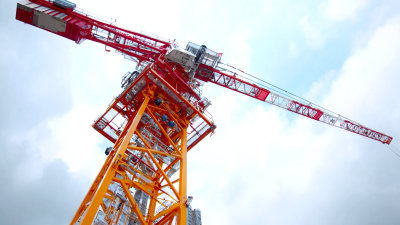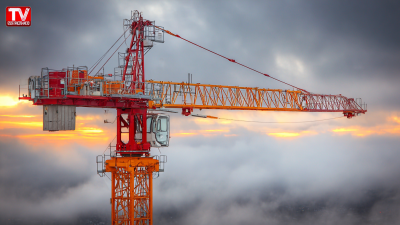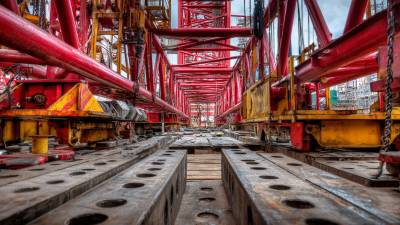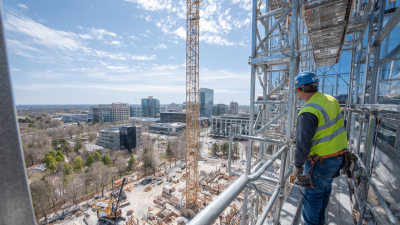In the construction industry, the demand for skilled workers continues to grow, with tower crane operators playing a pivotal role in ensuring project efficiency and safety. According to the U.S. Bureau of Labor Statistics, employment of crane and tower operators is projected to grow by 8% from 2020 to 2030, reflecting the increasing complexity and scale of construction projects.
 Tower crane jobs require specialized skills, including precision in operation, a strong understanding of load dynamics, and adherence to safety regulations. With the construction sector expected to contribute significantly to economic recovery, the need for proficient tower crane operators has never been more critical. As projects become larger and more demanding, understanding the unique skills required for these jobs is essential for both aspiring operators and industry stakeholders looking to maintain high safety and efficiency standards.
Tower crane jobs require specialized skills, including precision in operation, a strong understanding of load dynamics, and adherence to safety regulations. With the construction sector expected to contribute significantly to economic recovery, the need for proficient tower crane operators has never been more critical. As projects become larger and more demanding, understanding the unique skills required for these jobs is essential for both aspiring operators and industry stakeholders looking to maintain high safety and efficiency standards.
Tower crane operators play a crucial role in the construction industry, and possessing a unique set of technical skills is essential for success in this demanding job. First and foremost, operators must have a deep understanding of crane mechanics and operations. This includes knowledge of weight limits, load dynamics, and the various types of cranes used in different scenarios. Familiarity with the crane's controls and the ability to perform precise movements are vital, as even slight miscalculations can lead to accidents or project delays.
Additionally, safety awareness is paramount for tower crane operators. They must be well-versed in safety protocols and regulations to ensure not only their safety but that of their coworkers and the overall worksite. This includes understanding how to conduct pre-operation inspections and recognizing potential hazards. Communication skills are also critical, as operators typically work closely with ground crew members and need to convey information clearly, especially in high-pressure environments. By honing these key technical skills, tower crane operators can navigate the complexities of the construction industry and contribute significantly to the success of their projects.
Operating a tower crane in the construction industry is a high-responsibility job that necessitates a stringent adherence to safety protocols and best practices. The towering structures are often craned over busy job sites, making the need for precision and caution paramount. It is essential for crane operators to utilize proper safety gear, including hard hats, harnesses, and safety glasses, to protect themselves from potential hazards. Additionally, an operator must be well-versed in the specific safety regulations that govern crane operation in their region, which can vary significantly.

Best practices encompass regular equipment inspections and maintenance routines to ensure that all mechanical components are functioning correctly. Operators should be trained to conduct pre-operation checks, paying close attention to the limits of the crane’s load capacity, and should have a clear understanding of the load chart. Communication with ground crew members is crucial, and utilizing hand signals or radios can reduce the risk of accidents. By fostering a culture of safety and responsibility, tower crane operations can be conducted more efficiently, facilitating a smoother construction process while minimizing risks to all personnel involved.
In the construction industry, tower crane operators play a pivotal role in ensuring the successful execution of large-scale projects. Essential physical abilities are crucial for effective crane management, as operators must demonstrate excellent hand-eye coordination and spatial awareness. According to the Bureau of Labor Statistics, crane operators are expected to have a strong grasp of mechanics and the physical dexterity to handle controls with precision. This dexterity is critical, as studies indicate that 90% of incidents in crane operation are attributed to human error, underscoring the importance of skillful manipulation in complex environments.
Furthermore, operators must possess remarkable stamina and resilience, as crane operations often require long hours in physically demanding conditions. The National Institute for Occupational Safety and Health highlights that crane operators should be able to perform tasks requiring considerable physical effort, including climbing stairs and ladders, as well as working at heights. The ability to remain alert and focused during these periods directly influences safety and operational efficiency. As such, ongoing training and fitness assessments are necessary to maintain the high standards required in this demanding field.
| Skill | Description | Importance Level | Recommended Training |
|---|---|---|---|
| Hand-Eye Coordination | The ability to coordinate the movement of hands and eyes to control the crane effectively. | High | Simulator Training, Practical Drills |
| Physical Strength | The physical capability to manage the crane's controls effectively, particularly in manual operations. | Medium | Strength Training, Physical Conditioning |
| Attention to Detail | Ability to notice small changes in environment and operations to ensure safety and efficiency. | High | Safety Training, Situational Awareness Courses |
| Problem-Solving Skills | Ability to assess situations and come up with effective solutions quickly. | Medium | Scenario-Based Training, Workshops |
| Communication Skills | Effective and clear communication to coordinate with team members and ensure safety. | High | Communication Skills Training, Team Building Exercises |
 Effective communication and teamwork are essential components of success on construction sites, particularly in the context of tower crane operations. In a field where safety and precision are paramount, clear communication ensures that team members are well-informed of their responsibilities and any changes in plans. This not only helps in avoiding misunderstandings but also fosters a culture of trust and collaboration among diverse team members who may come from various backgrounds and locations. A cohesive team that communicates effectively can respond swiftly to challenges, ultimately leading to smoother project execution.
Effective communication and teamwork are essential components of success on construction sites, particularly in the context of tower crane operations. In a field where safety and precision are paramount, clear communication ensures that team members are well-informed of their responsibilities and any changes in plans. This not only helps in avoiding misunderstandings but also fosters a culture of trust and collaboration among diverse team members who may come from various backgrounds and locations. A cohesive team that communicates effectively can respond swiftly to challenges, ultimately leading to smoother project execution.
Moreover, teamwork in construction is not merely about collaboration; it’s about cultivating an environment where each member feels valued and engaged. Strong team dynamics facilitate the sharing of knowledge and skills, enhancing overall project performance. When team members work together harmoniously, they can leverage one another’s strengths, resulting in innovative solutions and improved efficiency. The ability to navigate conflicts and maintain open lines of communication is crucial for overcoming obstacles and reaching project goals, especially in the fast-paced atmosphere of construction sites.
In the rapidly evolving construction industry, continuous learning and certification opportunities for crane operators are more essential than ever. According to the Bureau of Labor Statistics, there is a projected 8% growth in employment for crane operators between 2021 and 2031, highlighting the increasing need for skilled professionals. As technology improves and regulations become stricter, staying updated through training programs and obtaining certifications can significantly enhance job prospects and safety on-site.
One key aspect of professional growth in tower crane jobs is participating in accredited training programs. These programs not only provide essential skills but also keep operators informed about the latest safety protocols. A study by the National Commission for the Certification of Crane Operators (NCCCO) shows that certified crane operators are 60% less likely to experience accidents, underscoring the critical need for ongoing education.
Tips for aspiring crane operators include seeking out apprenticeship programs that pair hands-on experience with classroom instruction, and joining professional organizations to access networking and mentorship opportunities. Additionally, pursuing specialty certifications, such as those for rigging and signaling, can set candidates apart in a competitive job market. Taking these steps ensures that operators remain at the forefront of industry standards and practices.






